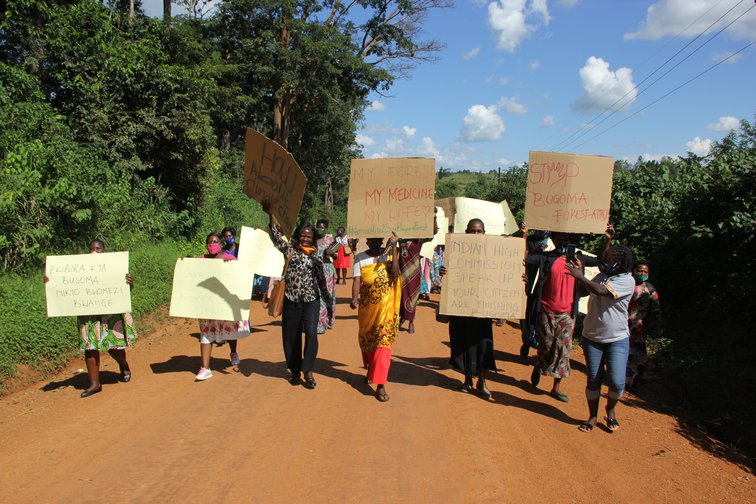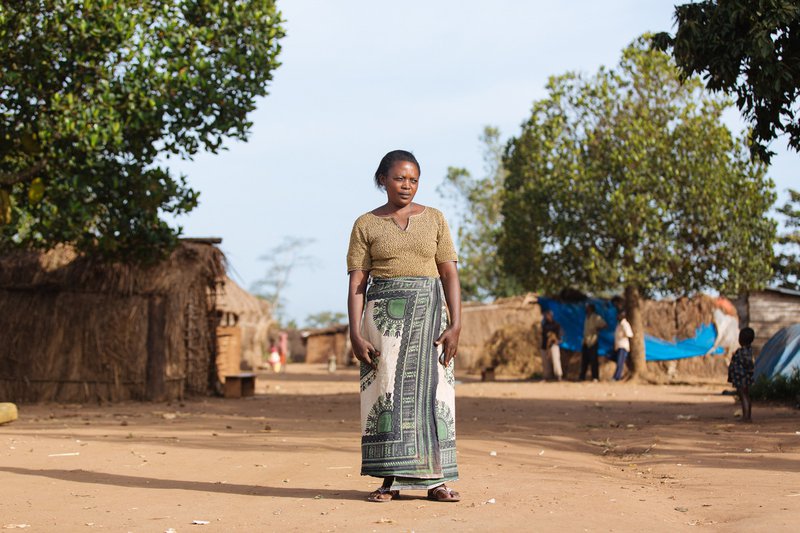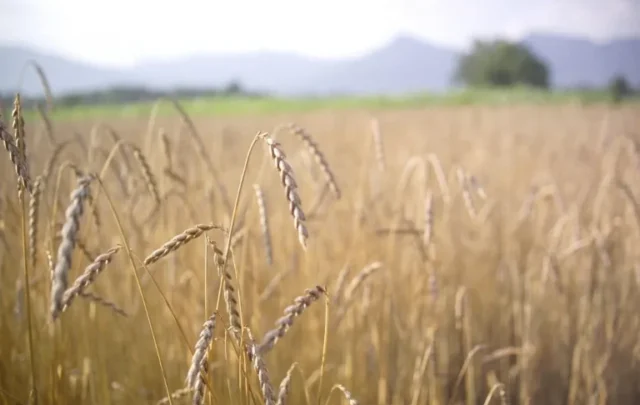As the world celebrates International Women’s Day, we shine a light on the women being displaced by oil-extractive business

Women protest Bugoma land give away in the Albertine Graben region of Uganda. National Association of Professional Environmentalists
“We were like squirrels against an elephant,” says Margaret Kagole of the Mbibo Zikadde Women’s Group in Uganda. “The oil officials destroyed our crops, driving through with tractors, graders, wires and trucks.”
Kagole is one of many women in the country impacted by oil companies beginning exploration activities on their land without the free, prior and informed consent of the community.
In 2006, Uganda discovered an estimated 6.5 billion barrels of crude oil in its Albertine Graben region. Since then, government negotiations with oil companies seeking access to land for oil exploration, as well as the construction of roads and an airport, have been opaque with minimal public scrutiny. Development projects, supported by the government, have been characterized by displacement, forced migration, low compensation rates, violence, land degradation, loss of livelihoods, and increased military presence to ‘protect’ oil workers and installations.
It is women and girls who are carrying the costs. Pre-existing gender inequalities have led to an unequal division of labour, in which women take primary responsibility for subsistence and care, receiving little state support and investment. Nearly 73% of Ugandan households engage in subsistence farming and women represent three-quarters of the agricultural force.
But despite women bearing the heaviest burden as primary farmers, they own only 7% of land and are marginalized in any decision-making on how the land is used. The lack of land-ownership means women do not benefit from compensation packages offered by infrastructure developments.

Perpetua in Kijayo Displacement Camp, after being evicted from her land | National Association of Professional Environmentalists
“Our hopes for justice are shrinking”
Jennifer Omirambe is one of hundreds of women in the Hoima, Buliisa, Nwoya and Amuru districts evicted to pave way for the construction of an oil refinery. She says her husband, like many, got excited at the prospect of 11 million Ugandan shillings (£2,444) in compensation cash and abandoned her and their children.
Stories of wives struggling with their husbands for a fair share of compensation after losing their land to oil projects are common, leaving women with lifelong social, economic and psychological effects.
At a feminist movement-building school held in 2018 in Albertine, women spoke of violence directed at them and shared how the government and corporations had made ‘promises’: from more jobs, resettlement on good land, better hospitals, schools and other infrastructure, to the building of an “executive airport” and full compensation for their land. Most of those promises had not come to bear. In fact, all the women and their communities were worse off – without their livelihoods, without their land and with very little recourse to justice.
Those who are evicted from their land and aren’t resettled often end up in one of Uganda’s Internally Displaced Persons camps (IDPs). Yoanina Musimenta, a woman living in Kigyayo in Hoima district IDP, noted that “some of the women and girl children have resorted to casual labour, sex for survival, around the sugar factory which replaced their homes. We have spent more than five years here and hopes for justice are shrinking.”
Fighting for women, fighting for the land
In spite of this violent reality, Uganda’s growing eco-feminist movement is organising against land grabs. Ecofeminism draws links between violence against nature and violence against women, seeing the health and wellbeing of both as intertwined.
In the Bugoma Forest, women’s groups are replanting trees and patrolling the forest boundary for illegal loggers. Seeking out alternative, sustainable livelihoods, the Bukigindi Tree Planting Women’s Group has replanted 18 hectares (45 acres) of degraded land, once protected rainforest, with indigenous species on the Buvuma islands. They offer alternative sustainable ways of living, rooted in indigenous practices.
Women use community green radio to raise their voices, address reported issues, organize and build consciousness about the exploitation of natural resources and the injustices women are subjected to on their bodies as part of the same system of patriarchy and capitalism. They are building collective knowledge and crafting strategies that respond to their needs.
On International Women’s Day 2021, we women of Uganda demand radical and revolutionary change in how we relate to nature and to each other and an end to corporate-driven extractivist ‘development’ that prioritizes profit at the expense of people and the planet.























